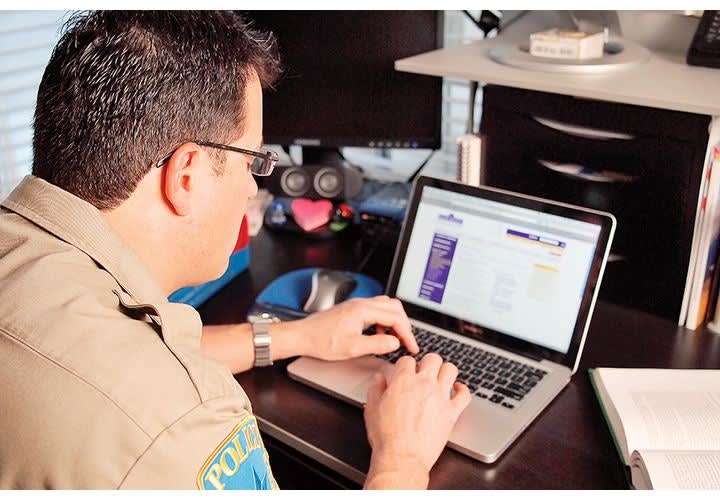Students need to seek out educational opportunities that hit a variety of learning styles—all programs (whether in a classroom or online) are not created equal.
As a father of two children, one of which was in high school and unsure of her own career path, Geoffrey DeCesari, then a sex crimes detective with the San Diego Police Department, knew it was on him to set an example. He wanted to be sure that his daughter understood the importance of continually learning and the value of an advanced degree.
But shift work and on-call weekends complicated his quest for higher learning. DeCesari knew educational flexibility would be a must if it were to fit into the demands of his job. "I was working investigations at the time, and frequently on call, so sitting in a classroom was not an option," he says.
He also knew the education had to come from an accredited university with an excellent reputation. He explains his alma mater for his undergraduate degree was having accreditation issues at the time, and for this reason he wanted to be sure he received a master's degree from a "university he could be proud of."
Originally, he planned to attend a master's degree program with the University of Colorado (USC), but he then learned the nearby University of San Diego (USD) offered a top-notch online degree program in his chosen field of study.
Twenty months later, DeCesari counted himself among the USD degree program's first graduates as he received his master's degree in Law Enforcement and Public Safety Leadership. The now sergeant with the San Diego PD says juggling work, home, and school was well worth the effort. "My responsibilities have dramatically increased; they started to increase even before I had my degree," he says. "But advancing my career is not the reason I returned to school. It wasn't even among my top three reasons for going back to school. I did this for myself."
DeCesari is among the thousands of law enforcement professionals who return to college every year for undergraduate and graduate degrees. But as this San Diego officer learned firsthand, working irregular hours and balancing work and family with school presents more than a few obstacles. Fortunately, there is a sea of educational options available to today's law enforcement professionals. The difficulty arises, however, in choosing an option that fits each individual student's situation.
Learning Online
As executive director of the Northwestern University Center for Public Safety, David Bradford needs to be aware of the types of education law enforcers need and the best ways to deliver that programming. Though he's careful not to place online education over traditional classroom learning, he does note that distance learning often fits nicely into the varied hours of police work.
"[For this reason,] we design classes for the individual student who may be in a small law enforcement department, where getting away from work for 10 weeks is going to be a burden on the administration and on the individual," he says.
Online education is an option that also fits well with student's home lives. The reality is that many law enforcement professionals are also balancing full-time careers, families, volunteer responsibilities, and more. "The option to enroll in online courses and work at their own pace gives officers the flexibility they need to pursue their degrees on their own time," says Jacob Harris, director of marketing for Columbia Southern University (CSU).
As the associate vice chancellor for Online Learning at the University of Illinois-Springfield, Ray Schroeder has studied and written about the benefits of online education, and is a huge believer in the format. Developments in the technology used to present coursework online have advanced and as such so have student outcomes. Schroeder points out that U.S. Department of Education studies have found that learning outcomes in online education are as good as or better than in the classroom. He cites the flexibility and control this type of learning affords students as a primary reason why. "They can do their online learning in the morning or at 2 a.m. after their shift, and they can repeat the materials over and over until they know it. They just back it up and play it again."
Online is Not for Everyone
Though the benefits to online ed for law enforcers can be somewhat obvious, DeCesari cautions that this type of education isn't for everyone.
"The primary disadvantage to online education is the type of learner that you are," he says. "If you are a tactile learner, you will have problems with online education. These classes are based on lectures, speeches, videos, reading, and online discussions with other students. While my style of learning fit well with this programming, if you need to touch things to learn, then classroom education might be a better fit. You also need to have some personal drive to meet deadlines and work at home."
Bradford concurs, "One thing we have found is that sometimes people come into an online program thinking it's not going to be as academically vigorous as a classroom program, and these individuals are surprised at how much effort it takes for them to do a class online. We occasionally have people who drop out because they cannot keep up."
Jason Lemon, dean of Professional and Continuing Education at SDU, asserts that certain personalities are better suited to an online format vs. a classroom experience, and vice versa. Though online learning appears to work well for law enforcers because it offers scheduling flexibility, he says "goal and action-oriented people" thrive in this space because there is no time wasted in "driving, parking, waiting around for other students or the instructor, and dealing with administrative things (like roll call). Every moment spent in an online course can be an active and engaged learning time. But students who need the physical structure of being at a certain place, at a certain time, in order to get their assignments and learn the material will appreciate an on-ground course more than an online course."
Schroeder emphasizes that students need to seek out educational opportunities that hit a variety of learning styles—all programs (whether in a classroom or online) are not created equal. The best programs, he says, present material in a variety of ways. Programs that utilize video, audio, text, case studies, simulations, and other forms of interactive study meet the needs of a variety of learning styles.
Success in either type of program requires discipline. DeCesari says he entered his online program with the thought that he would study on Tuesday, Wednesday, and Thursday nights, but that went out the window in short order as he found his studies disrupted by calls for service. He says he had to learn to look ahead and turn in work early when he knew he'd be on call. Fortunately, professors provided a comprehensive overview of the work and when it was due well in advance. "I generally had four days to plan ahead, so if I knew I was on-call or would be working a holiday weekend, where a sex crimes detective would likely be called out, I could plan for it," he says. "If this program had been self-paced, I would probably still be in my second semester. I had to be very regimented and look ahead."
Tom Hardiman is the associate vice president of Business Development, Law Enforcement at the FBI National Academy, and serves as the director of the Law Enforcement Strategic Relationships Team at American Military University (AMU). He has seen some AMU students thrive in an online setting and others fail. Successful outcomes hinge on a student's learning style and self-discipline, especially in the online setting. "If you didn't do your homework, and you are attending a night class, you can kind of sit in the back of the classroom and slink down in your chair," he says. "But with online education, students are expected to participate every week, and it becomes impossible to skate by on a busy week where you didn't get to your reading."
Whatever type of programming students ultimately select, they need to be mindful of whether or not they possess a strong support system, on the job, in the home, and at school. "CSU believes if students have a strong support system, they can achieve anything, so we provide a dedicated support team to help students along the way," Harris says. "Whether it's pulling transcripts or uploading their first assignment to Blackboard, or assisting students with math and writing, someone is available to help them."
Harris advises students to work with their academic advisors throughout their enrollment to help them with issues concerning degree programs, course selection, academic decisions, and so on. "This helps them stay on track in order to meet their academic goals," he says.
Network with Your Peers
Students must be prepared to interact within the classroom setting, be it virtual or on the ground. Schroeder warns, however, that a classroom setting can be difficult for some students who are slower to speak up. "Studies show that teachers wait no more than three seconds to call on a student after posing a question," he says. "Some students process a question longer than others before responding, so in a classroom setting you often have the same students responding over and over, while those with English as a second language or those who are deeper thinkers, never get a chance to talk. In an online setting, the instructor poses a question then looks for responses from everyone by a certain date, and every student gets a chance to respond and read the responses from the other students."
"Online and on-campus programs require intellectual curiosity along with note-taking ability and solid verbal and written communication skills," says Lemon. "Because online degree programs generally require more writing—both in the weekly written assignments and in ongoing discussion forums with fellow students and instructors—officers will be constantly challenged to sharpen their ability to create logical, compelling, written arguments to express their ideas."
NUCPS' Bradford states that every class the university offers is available online or in the classroom. He notes that when students spend 10 weeks in a classroom with others, they develop a peer network within the class. One of the biggest worries they had when transitioning to online was losing that network. "We found that more networks are developed online and the networks are stronger and more active after the class closes than they were on the ground," he says. "People who go through a class online tend to maintain contact at a lot higher rate than those who go to class on the ground."
He theorizes that this is due to the fact that students have already exchanged contact information in an online program, and students are already in the habit of connecting in an online format.
"Behavior psychologists tell us it takes 21 days to establish a habit so that it becomes part of your routine," he says. "Students have that online habit going by the time they are done."
The networking aspect of the online format is one of the things DeCesari says he liked best. "I now know law enforcement officials from Florida to California," he says.
Whatever the format, DeCesari advises potential students to take on the challenge today. Advanced education touches on important topics such as drone polices or extracting intelligence from a cell phone or using social media as an investigation tool, which helps law enforcement professionals evolve and be more forward thinking. "When I considered going back to school, I thought 20 months seemed like a long time," he says. "But I just finished and looking back it wasn't really that long at all. It is possible to balance work, home, and school; you just need to go back and do it."
Ronnie Garrett is a freelance writer based in Fort Atkinson, WI. Garrett specializes in writing about law enforcement and criminal justice topics.











